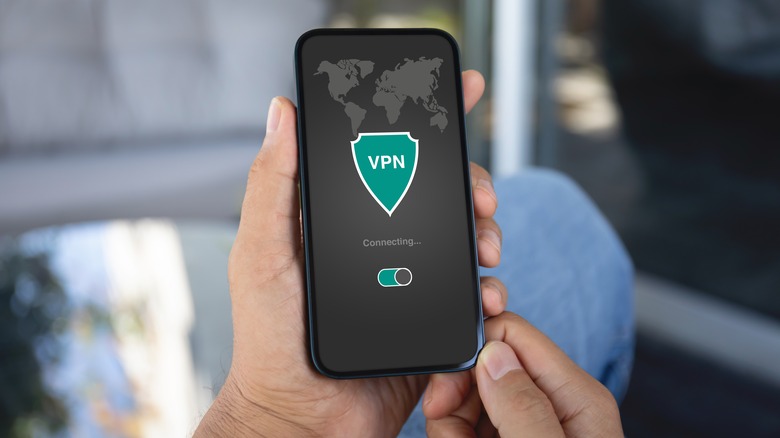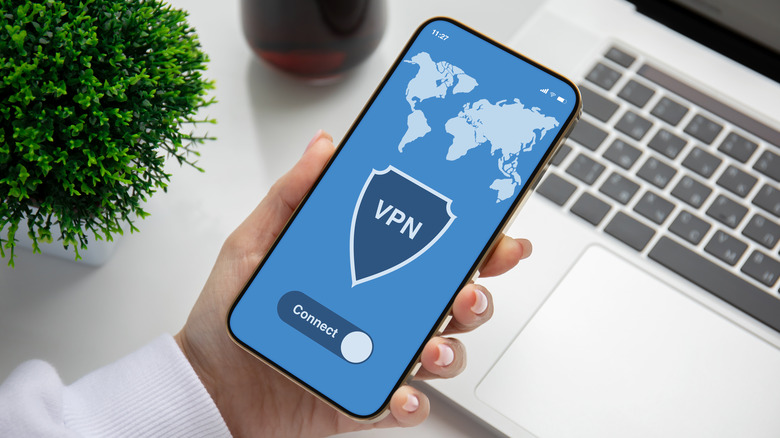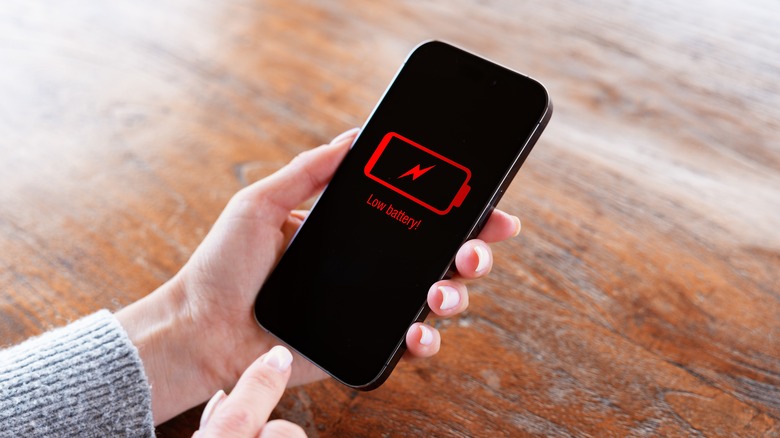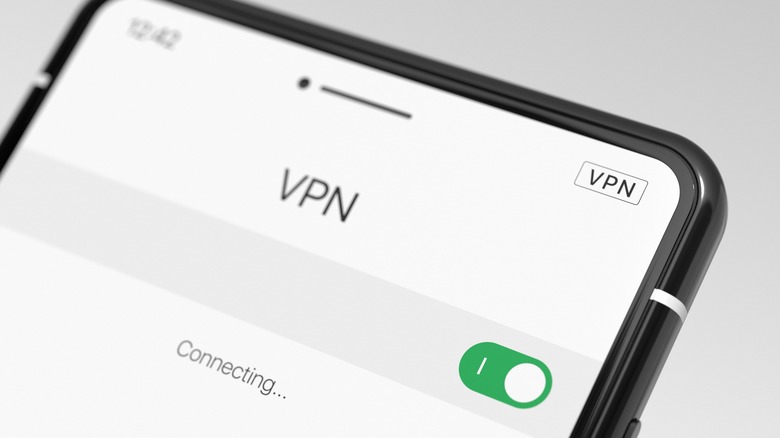Do You Really Need A VPN On Your Phone?
For the uninitiated, a virtual private network (VPN) masks the device's IP address, allowing users to safely browse the internet, use apps, and shop without anybody monitoring their activity. While plenty of people install a VPN on their computer at home to keep their ISP or the government from viewing their activity, the larger risk is when they're out and about. The most vulnerable a person can be on the internet is when they're connected to a public Wi-Fi network. That's where anybody can log in without a password. Not only can users access the internet with public Wi-Fi, but cybercriminals use these access points to sneak into a person's system and steal (or worse) their information.
While plenty of laptop users at Starbucks and the library access free Wi-Fi, people access the internet considerably more with their phones than anything else. Since the general public keeps boatloads of sensitive information on their phones, from their credit card information (Apple Wallet and Google Wallet) to their home address, doesn't it stand to reason that everyone should install a VPN on their phone? Here are a few things to consider if you're not quite sure about the matter.
Benefits of a VPN on your phone
As of 2022, 85% of Americans own a smartphone, which gives users access to a plethora of social media and e-commerce apps, such as Threads and Amazon, respectively. Many of those users likely access free public Wi-Fi when they're out and about. However, accessing public Wi-Fi can pose some dangers because your data is free for anyone with the right set of skills to see. They can then use your data to steal your identity, gain access to sensitive files on your phone, and potentially even lock your phone.
With a VPN on your smartphone, you have total anonymity. Your data is encrypted, making it increasingly difficult for threat actors to know what's what. Furthermore, all that data that Meta and other social media companies like to use and sell to third parties becomes just as useless for them. The top VPNs to use in 2024 offer a nice way to stick it to the "man."
VPNs' real pièce de résistance is getting around geo-restrictions with streaming apps like Netflix. Each country has different licensing agreements and regulatory requirements, giving different regions access to some content that isn't available in other areas of the world. Smartphones are great for watching TV and movies, especially when you're on the move a lot. With a VPN, you can trick the streaming service into thinking you're in the U.K. when you're really across the pond, letting you watch "Rick and Morty."
Drawbacks of a VPN on your phone
There are some considerations to be had when deciding whether you want a VPN on your phone or not. While security is a definite plus, many phone users might value their internet speed over said security. When using a VPN, the phone's connection has to go through a server that's most likely nowhere near it. Some servers can be in completely different countries, which is partly how VPN users can get through geo-location restrictions. While users can usually choose a server close to them, it's still going to slow down how fast the phone browses the internet. For example, if the download speed for your internet is 100mpbs, using a VPN might bring it down to 80mbps.
What a person is doing on their phone, the number of users operating on the same server, the distance the phone is from the server, and the encryption protocols the VPN provider uses all affect the speed. If you thought you could use a mobile VPN to get around your data cap, sorry, but no. In fact, using a VPN on your phone uses between 4% to 20% additional data.
Furthermore, a VPN drains the battery, like any app running on your phone, whether actively or in the background. Running a VPN on your phone will drain 5% to 15% of the battery. While these might seem like insignificant drawbacks, it's some food for thought if you're on the fence about adding a VPN to your phone.
The bottom line
When it comes down to it, do you really need a VPN on your phone? In the strictest sense of the word "need," no, you don't need one. Your phone will work perfectly fine without one. However, if you value your privacy on the internet, there's no better way to ensure it than with a VPN. As previously mentioned, there are a number of other evident benefits in addition to the privacy one receives when installing a VPN.
Sure, the drop in speed can be discouraging, but the ability to get around geographically locked content is a nice bonus. It's never a bad idea to have a trusted VPN available. Some VPN providers even let you use their service on multiple devices, ensuring you're safe and anonymous on your phone and computer. If you opt to install a VPN on your phone, try to stay away from a free VPN service. You end up paying in other ways besides financially.
If your budget isn't the biggest, there are affordable VPNs for Android and iPhone that are excellent options, but a premium VPN service invests more money in its infrastructure and features, improving users' experience with it. Not to mention, they have the money to invest in an independent audit to give users peace of mind that their data isn't being used.



